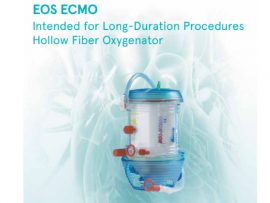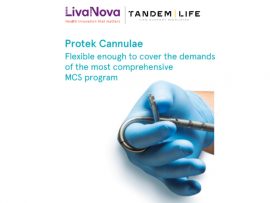Abstract Introduction Intraoperative myocardial protection during aortic valve replacement (AVR) for aortic stenosis (AS) is of paramount importance for outcomes. The dose of cardioplegia is usually calculated with reference to body mass. Aim..
Lee masAbstract Extracorporeal cardiopulmonary resuscitation (ECPR) has emerged in the context of the emergency department as a life-saving therapy for patients with refractory cardiac arrest. This review examines the utility of..
Lee masAbstract Background Venoarterial extracorporeal membrane oxygenation (ECMO) provides full hemodynamic support for patients with cardiogenic shock, but optimal timing of ECMO initiation remains uncertain. We sought to determine whether earlier..
Lee masAbstract Purpose: The 2021 guidelines endorsed by the European Resuscitation Council (ERC) and the European Society of Intensive Care Medicine (ESICM) recommend using highly malignant electroencephalogram (EEG) patterns (HMEP; suppression..
Lee masAbstract Objective: The number of out-of-hospital cardiac arrest (OHCA) patients who may benefit from prehospital extracorporeal cardiopulmonary resuscitation (ECPR) is yet to be elucidated. Patient eligibility is determined both by case..
Lee masAbstract Background The present article describes three cases of patients in cardiogenic shock (CS) with previous cardiac surgery that made them initially inoperable. Perioperative support with veno-arterial extracorporeal membrane oxygenation..
Lee masAbstract Objectives: Extracorporeal cardiopulmonary resuscitation (ECPR) is the implementation of venoarterial extracorporeal membrane oxygenation (VA-ECMO) during refractory cardiac arrest. The role of left-ventricular (LV) unloading with Impella in addition to..
Lee masAbstract Introduction Critically ill patients supported with venoarterial (VA ECMO) are at risk of developing severe arterial , which has been associated with increased mortality. Lower saturation targets in this population may..
Lee masAbstract This case report describes a prehospital extracorporeal cardiopulmonary resuscitation (ECPR) in a female patient who suffered a sudden cardiac arrest while shopping in a supermarket. The success of this..
Lee masAbstract Background Patients with valvular heart disease require and cardiac arrest. Here, we test the hypothesis that exosomal hemoglobin formed during mediates acute cardiac injury in humans and in an animal model..
Lee masAbstract Introduction In children with myocarditis or dilated cardiomyopathy (DCM) on extracorporeal membrane oxygenation (ECMO) for cardiogenic shock, it is often necessary to decompress the left heart to minimize distension..
Lee masAbstract Background Veno-arterial Extracorporeal Membrane Oxygenation (VA-ECMO) is a rescue treatment in refractory cardiogenic shock (CS) or refractory cardiac arrest (CA). Exposure to hyperoxemia is common during VA-ECMO, and its..
Lee masExtracorporeal membrane oxygenation in diabetic ketoacidosis-related cardiac and respiratory failure
Abstract Introduction: Diabetic ketoacidosis (DKA) is a common clinical problem. When patients develop severe shock and/or respiratory failure, extracorporeal membrane oxygenation (ECMO) may be considered. This case series describes the..
Lee masAbstract Introduction Growing evidence supports cardiopulmonary resuscitation (ECPR) for refractory out-of-hospital cardiac arrest (OHCA) patients, especially in experienced centres. We present characteristics, , and outcomes of patients treated with ECPR in a..
Lee masAbstract Diseases affecting the aortic arch often require surgical intervention. Hypothermic circulatory arrest (HCA) enables a safe approach during open aortic arch surgeries. Additionally, HCA provides neuroprotection by reducing cerebral..
Lee masAbstract Introduction Survival from refractory out of hospital cardiac arrest (OHCA) without timely return of spontaneous circulation (ROSC) utilising conventional advanced cardiac life support (ACLS) therapies is dismal. CHEER3 was..
Lee masAbstract The pathophysiology of post-cardiac arrest syndrome features ischaemic/reperfusion injury and the release of high levels of inflammatory cytokines [1]. These inflammatory markers include interleukin-6 (IL-6), C-reactive protein (CRP), tumour..
Lee masAbstract Venoarterial extracorporeal membrane oxygenation (VA-ECMO) initiation for patients with cardiogenic shock or cardiac arrest is an attractive strategy since it provides a quick restoration of organ perfusion. One major..
Lee masAbstract Cardiogenic shock (CS) and cardiac arrest (CA) are among the most lethal complications of acute cardiovascular disease, affected by high in-hospital mortality rates. Venoarterial extracorporeal life support (VA ECLS)..
Lee masAbstract Advanced Cardiac Life Support (ACLS) guidelines recommend a standardized approach to manage cardiac arrest, including cardiopulmonary resuscitation (CPR), defibrillation, and administration of drugs such as epinephrine [1]. Ultrasound (US)..
Lee masAbstract Background Perioperative stroke after cardiac surgical procedures carries significant morbidity. Dual with electroencephalography (EEG) and somatosensory-evoked potentials detects cerebral hypoperfusion and predicts postoperative stroke in noncardiac procedures. We further evaluated..
Lee masAbstract Background Extracorporeal cardiopulmonary resuscitation (ECPR) has been shown to improve neurologically favorable survival for patients with refractory ventricular tachycardia (VT)/ventricular fibrillation (VF) out-of-hospital cardiac arrest. Prior studies of the impact of age..
Lee masAbstract Venoarterial extracorporeal membrane oxygenation (VA-ECMO) exposes the patient to infectious complications related to the cannulas or the site of insertion. The aim of the current study was to investigate..
Lee masAbstract OBJECTIVES: Extracorporeal membrane oxygenation (ECMO) is an advanced treatment for acute severe respiratory failure. Patients on ECMO are frequently maintained sedated and immobilized until weaning from ECMO, first, and..
Lee masAbstract The International Liaison Committee on Resuscitation engages in a continuous review of new, peer-reviewed, published cardiopulmonary resuscitation and first aid science. Draft Consensus on Science With Treatment Recommendations are..
Lee masAbstract Purpose: Patients who are successfully resuscitated following out‑of‑hospital cardiac arrest (OHCA) are still at a highrisk of neurological damage and death. Inflammation and brain injury are components of the..
Lee masAbstract Background: Veno-arterial extracorporeal membrane oxygenation (VA-ECMO) can re-establish tissue perfusion in refractory cardiac arrest requiring cardiopulmonary resuscitation (CPR). Levosimendan showed potential benefit in VA-ECMO weaning and mortality but was not..
Lee masAbstract Hemodynamic instability in postresuscitation syndrome worsens survival and neurological outcomes. Venoarterial extracorporeal membrane oxygenation (VA ECMO) for refractory cardiac arrest might improve outcomes. Hemodynamical support under VA ECMO relies..
Lee masAbstract Supplemental oxygen is a standard therapeutic intervention for critically ill patients such as patients suffering from cardiac arrest, myocardial ischemia, traumatic brain injury, and stroke. However, the optimal oxygenation..
Lee masAbstract Introduction: Critically ill patients with inflammatory dysregulation and organ disfunction may benefit from blood purification, although the use of this technique has not been described in large case series. We..
Lee mas













